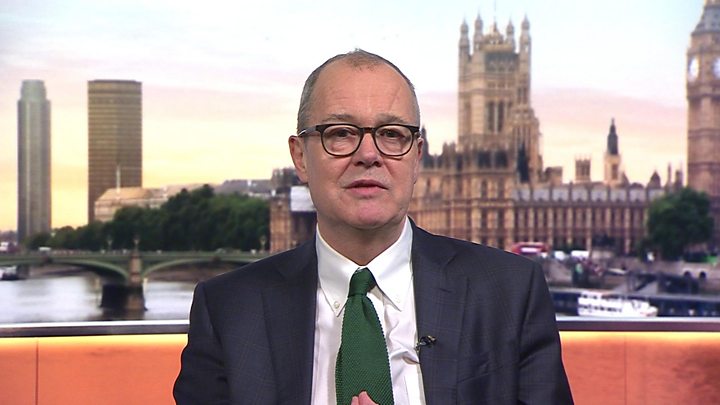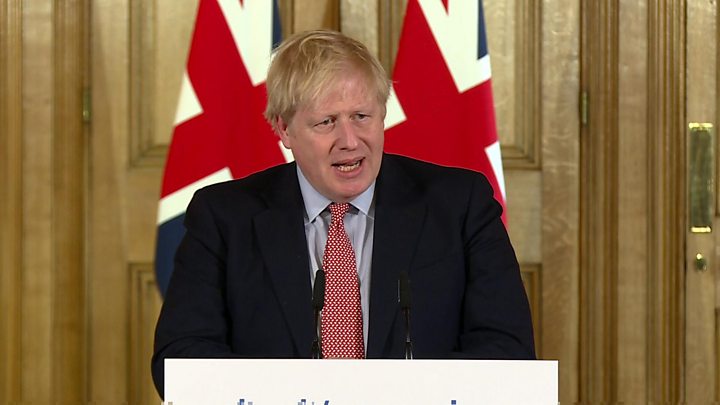
Media playback is unsupported on your device
Telling those with a high temperature or cough to self-isolate for a week will have the "biggest impact" in the fight against coronavirus, the UK's chief science adviser says.
Sir Patrick Vallance said the new advice was a "big intervention", amid criticism of the government's plan to combat the virus.
The UK has moved from "containing" the coronavirus to "delaying" it.
But ex-health secretary Jeremy Hunt called for more stringent measures.
All professional football leagues in England, and professional and grassroots games in Scotland, have been suspended until at least 3 April.
The Foreign Office has advised against all but essential travel to some areas of Spain, including Madrid.
There have been 596 confirmed cases across the UK, but health officials have said they believe the actual number of people infected could be between 5,000 and 10,000.
In total, 10 people have now died in the UK with the virus.
Jeremy Hunt told BBC Newsnight the decision to hold off cancelling large gatherings was "surprising and concerning" when we have "four weeks before we get to the stage that Italy is at".
Much of Italy - the world's worst-hit country after China - is currently in lockdown as its tally of deaths has topped 1,000.
"You would have thought that every single thing we do in that four weeks would be designed to slow the spread of people catching the virus," added Mr Hunt, who was health secretary for six years and quit as foreign secretary in July.
But Sir Patrick told the BBC: "The most likely place you are going to get an infection from is a family member or friend in a small space, not in a big space."
Defending the new tactics, he said: "The first set of measures are actually rather large."
"We have just asked a lot of people to isolate, stay at home, if they have got symptoms of mild upper respiratory tract infection, cough or fever. That is a big change," he added.
"We have also talked about the possibility of whole households staying at home if one person has got [coronavirus] - that may come in later.
"And importantly we are also talking about that during the peak when people are most likely to get infected, the elderly and vulnerable are properly protected. This is not a short-term thing, it is going to go on for weeks."
He said that closing schools was a "very effective way of dealing with pandemic flu" but that with this coronavirus, "the role of children is less clear in terms of spreading the disease".
Sir Patrick said it is hoped the government's approach will create a "herd immunity in the UK".
"Our aim is to try and reduce the peak, broaden the peak, not suppress it completely," he said.
"Also, because the vast majority of people get a mild illness, to build up some kind of herd immunity so more people are immune to this disease and we reduce the transmission.
"At the same time we protect those who are most vulnerable to it."
He also said the new coronavirus is likely to become "an annual seasonal infection".
'Keep calm and carry on'
The worst health crisis in a generation. Lives will be lost. All this is true. But what got missed in the government's coronavirus message - understandably, given the scale of the challenge - is that we should also get on with our lives.
We should keep calm and carry on (while following the advice, of course). At the moment, there are two basic things to do - wash our hands regularly and isolate if we develop symptoms.
We should still go out, play sport, attend events and keep children in school. Why? Short of never leaving your home and the rest of the household following suit, it's impossible to eliminate the risk of getting the virus. It's circulating.
Even if you skip your trip to a concert or the theatre, you may well catch it on your way to work or when you do the weekly shop.
This virus is with us now. And it will be for the foreseeable future. Only when we have a vaccine or if herd immunity develops - if enough of the population is exposed to it - will we have protection.
There will no doubt be a time when drastic measures are needed - to flatten the peak, protect the most vulnerable at the time of highest risk and stop the NHS getting overwhelmed - but it's not now. That's the clear message.
Mr Hunt, chair of the Commons health and social care committee, said countries who appeared to have been successful in turning back the virus had "moved very early" on introducing social distancing.
Sir Patrick said that new advice for care homes would become important as the epidemic progressed.
On Thursday, Prime Minister Boris Johnson announced new measures aimed at protecting the elderly and those most vulnerable to the disease - including that anyone with a persistent cough or high temperature should self-isolate for a week.
The PM said there was no need to close schools at the moment, saying "the scientific advice is that this could do more harm than good at this time".

Media playback is unsupported on your device
The UK government's health advisers are working on the assumption that Britain will not see infection rates peak for up to three months.
Ministers said it was important to get the timing right for stricter measures because people would tire of them after a few weeks.
As the epidemic reaches its peak, it is likely elderly people and those with health conditions will be told to cut social contact and stay at home.
Scotland is among the countries to have restricted mass gatherings, along with the Irish Republic, which has also closed schools and other public facilities. Schools in Northern Ireland will close at some stage, First Minister Arlene Foster said.
Elsewhere, France is one of the latest European countries to close all schools, universities and nurseries. In the US, all major sport has been suspended and Broadway performances are off for a month.
Outbreaks in Spain led the Foreign Office to update its travel advice for certain regions and municipalities but flights will continue as normal.
In other developments:
- School leaders called for clear guidance ahead of any widespread school closures
- Cabinet Minister Anne-Marie Trevelyan tested negative for coronavirus after coming into contact with Nadine Dorries, the first MP to contract the virus
- Saint Patrick's Day celebrations were cancelled in London
- Some care home firms announced restrictions on visitors, with one banning children from seeing residents
- UK and EU negotiators agreed not to hold face-to-face talks next week on Brexit
- The Electoral Commission recommended that local polls due in May should be postponed until the autumn
- Chelsea FC's full squad went into self-isolation after winger Callum Hudson-Odoi got a positive diagnosis
The number of UK cases rose by more than 100 on Thursday - with 491 in England, 60 in Scotland, 20 in Northern Ireland and 25 in Wales.
Public Health England has released new guidance for those staying at home because they have symptoms of the virus - a cough or a temperature of 37.8C (100F) or more.
Its advice states:
- Not to go to work, school, or public areas, use public transport or taxis - or even for a walk
- Those with even mild symptoms of infection should stay at least two metres away from other people in their homes, and should sleep alone
- Those with confirmed or suspected cases should use a separate bathroom if they can, or thoroughly clean facilities after using them if they live with other people
How have you been affected by coronavirus? Get in touch by emailing haveyoursay@bbc.co.uk.
Please include a contact number if you are willing to speak to a BBC journalist. You can also contact us in the following ways:
https://news.google.com/__i/rss/rd/articles/CBMiJGh0dHBzOi8vd3d3LmJiYy5jb20vbmV3cy91ay01MTg2NTkxNdIBKGh0dHBzOi8vd3d3LmJiYy5jb20vbmV3cy9hbXAvdWstNTE4NjU5MTU?oc=5
2020-03-13 09:22:51Z
52780663037337
Tidak ada komentar:
Posting Komentar